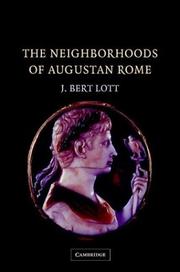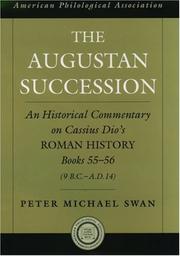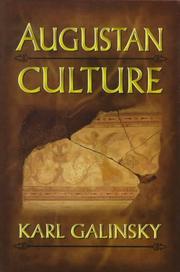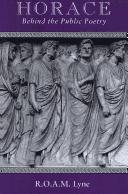| Listing 1 - 10 of 16 | << page >> |
Sort by
|

Abstract | Keywords | Export | Availability | Bookmark
 Loading...
Loading...Choose an application
- Reference Manager
- EndNote
- RefWorks (Direct export to RefWorks)
This volume investigates the neighborhoods of ancient Rome during the reign of the first Roman Emperor, Caesar Augustus (27 BCE-14 CE). Focusing on a group of neighborhood-based voluntary associations that were important political and social communities for the city's diverse population of slaves and ex-slaves, it locates the Augustan neighborhoods within the broader context of the history of Rome. John Bert Lott stresses their importance as physical and cultural divisions of the city and investigates the distinctive relationship between local neighborhoods and Augustus himself. An interdisciplinary study that makes use of archaeological, epigraphic, and topographic evidence, this book makes an important contribution to our knowledge of the urban life of Rome's lower classes and to our understanding of the imperial ideology that supported the development of the dynastic Roman monarchy.
Neighborhood --- Rome --- Social life and customs --- History --- Social life and customs. --- Neighborhoods --- Augustus, 30 B.C.-14 A.D. --- Neighborhood - Rome --- Rome - Social life and customs --- Rome - History - Augustus, 30 B.C.-14 A.D.

ISBN: 1280534214 0195347145 1423720849 1433700905 9781423720843 0195167740 9780195167740 9781280534218 9780195347142 9781433700903 0197704328 Year: 2004 Volume: 47 Publisher: Oxford: Oxford University Press,
Abstract | Keywords | Export | Availability | Bookmark
 Loading...
Loading...Choose an application
- Reference Manager
- EndNote
- RefWorks (Direct export to RefWorks)
This is an historical commentary on Books 55-56 of Dio's Roman History. These books recount the last half of the reign of the Emperor Augustus, above all his orchestration of the first imperial succession. Addressed to both students and scholars, the new commentary is the first since the eighteenth century to offer full and fresh treatment of this segment of Dio's work.

ISBN: 069104435X 9780691044354 0691058903 9780691058900 Year: 1996 Publisher: Princeton, NJ ; Chichester Princeton University Press
Abstract | Keywords | Export | Availability | Bookmark
 Loading...
Loading...Choose an application
- Reference Manager
- EndNote
- RefWorks (Direct export to RefWorks)
Grand political accomplishment and artistic productivity were the hallmarks of Augustus Caesar's reign (31 B.C. to A.D. 14), which has served as a powerful model of achievement for societies throughout Western history. Although much research has been done on individual facets of Augustan culture, Karl Galinsky's book is the first in decades to present a unified overview, one that brings together political and social history, art, literature, architecture, and religion. Weaving analysis and narrative throughout a richly illustrated text, Galinsky provides not only an enjoyable account of the major ideas of the age, but also an interpretation of the creative tensions and contradictions that made for its vitality and influence. Galinsky draws on source material ranging from coins and inscriptions to the major works of poetry and art, and challenges the schematic concepts and dichotomies that have commonly been applied to Augustan culture. He demonstrates that this culture was neither monolithic nor the mere result of one man's will. Instead it was a nuanced process of evolution and experimentation. Augustan culture had many contributors, as Galinsky demonstrates, and their dynamic interactions resulted in a high point of creativity and complexity that explains the transcendence of the Augustan age. Far from being static, its sophisticated literary and artistic monuments call for the active response and involvement of the reader and viewer even today.
Rome --- Civilisation --- History --- Civilization. --- -Rome --- Augustus, 30 B.C.-14 A.D. --- Civilization --- Rome - History - Augustus, 30 B.C.-14 A.D. --- Cultuurgeschiedenis. --- Romeinse keizertijd. --- Kultur. --- Kulturpolitik. --- Latein. --- Literatur. --- Religion. --- Kunst. --- Augustus, --- 30 B.C.-14 A.D. --- Roma --- Rome (Empire). --- Römisches Reich. --- Storia --- Intellectual life. --- Histoire --- Civilisation. --- Augustus [Roman emperor] --- Rome - Civilisation
Book
ISSN: 16136950 ISBN: 9783447057158 3447057157 Year: 2008 Volume: 8 Publisher: Wiesbaden : Harrassowitz,
Abstract | Keywords | Export | Availability | Bookmark
 Loading...
Loading...Choose an application
- Reference Manager
- EndNote
- RefWorks (Direct export to RefWorks)
Der Sammelband stellt die Beiträge der interdisziplinären Tagung in Mainz vom 12.10.–14.10.2006 zusammen. Im Mittelpunkt der einzelnen Untersuchungen steht im Vergleich zu früheren Studien weniger die Betrachtung und Einschätzung des Princeps aus einer dezidiert römischen Sicht als vielmehr der Versuch, die umgekehrte Perspektive zu beleuchten, d. h. den diversen, von außen auf Augustus gerichteten Blicken nachzugehen und zu fragen, in welchem Maße die Sichtweisen der Betrachter apriorisch die Auffassung seiner Person dirigierten, beispielsweise nur die Anbindung an einen vorgeprägten eigenen Herrscherbegriff zuließen. In umfassenderem Sinn betrifft das sowohl unbewusste Transformationen als auch gezielte Bedeutungszuweisungen. Dabei gilt es ferner zu überlegen, inwiefern ‚Klientelstaaten‘ und die Provinzen des Reichs gleiche Voraussetzungen boten und zu gleichen Lösungen gelangten. Grundsätzlich darf man davon ausgehen, dass die Augustus applizierten Vorstellungen mit bestehenden Mustern der örtlichen Kontexte kulturell abgeglichen werden mussten. Dadurch entstanden neue Normen, mit denen sich Augustus definieren ließ, mit denen aber ebenso die Relation zu ihm definierbar wurde.
Augustus, --- Congresses. --- Rome --- History --- Kings and rulers --- Antiquities --- Congresses --- Histoire --- Congrès --- Rois et souverains --- Antiquités --- Conferences - Meetings --- Congrès --- Antiquités --- Augustus, - Emperor of Rome, - 63 B.C.-14 A.D. - Congresses --- Rome - History - Augustus, 30 B.C.-14 A.D. - Congresses --- Rome - Kings and rulers - Congresses --- Augustus, - Emperor of Rome, - 63 B.C.-14 A.D.
Book
ISBN: 9781469621265 9781469623146 1469623145 9781469621272 1469621274 1469621266 1469668688 9798890846396 Year: 2015 Publisher: Chapel Hill, NC : The University of North Carolina Press,
Abstract | Keywords | Export | Availability | Bookmark
 Loading...
Loading...Choose an application
- Reference Manager
- EndNote
- RefWorks (Direct export to RefWorks)
Fred Drogula studies the development of Roman provincial command using the terms and concepts of the Romans themselves as reference points. Beginning in the earliest years of the republic, Drogula argues, provincial command was not a uniform concept fixed in positive law but rather a dynamic set of ideas shaped by traditional practice. Therefore, as the Roman state grew, concepts of authority, control over territory, and military power underwent continual transformation. This adaptability was a tremendous resource for the Romans since it enabled them to respond to new military challenges in effective ways. But it was also a source of conflict over the roles and definitions of power.
Command of troops --- Commandement des troupes --- Rome --- History, Military. --- History --- Histoire militaire --- Histoire --- History, Military --- Leadership, Military --- Military leadership --- Troops, Command of --- Military art and science --- Leadership --- Command of troops. --- Command of troops - Rome --- Rome - History, Military --- Rome - History - Republic, 510-30 B.C. --- Rome - History - Augustus, 30 B.C.-14 A.D.
Book
ISBN: 0520066766 Year: 1990 Publisher: Berkeley : University of California Press,
Abstract | Keywords | Export | Availability | Bookmark
 Loading...
Loading...Choose an application
- Reference Manager
- EndNote
- RefWorks (Direct export to RefWorks)
Emperors --- -Rulers --- Sovereigns --- Heads of state --- Kings and rulers --- Monarchy --- Biography --- Augustus Emperor of Rome --- Rome --- History --- -Emperors --- Biography. --- Augustus, --- -Biography --- Octavius Caesar, --- Gaius Octavius, --- Octavius, Gaius, --- Octavianus, --- Octavianus, Gaius Julius Caesar, --- Gaius Julius Caesar Octavianus, --- Octavian, --- Caius Julius Caesar Octavianus, --- T︠S︡ezarʹ Oktavian Avgust, --- Oktavian-Avgust, T︠S︡ezarʹ, --- Avgust, T︠S︡ezarʹ Oktavian, --- Octavianus Augustus, --- Augusto, --- Cesarz August, --- Ogusṭus, --- Augustus Caesar, --- Gaius Octavius Thurinus, --- Octavio Augusto, --- Cayo Octavio Turino, --- Thurinus, Gaius Octavius, --- Turino, Cayo Octavio, --- אוגוסטוס --- Augustus --- Augustus, 30 B.C.-14 A.D. --- Augustus, Emperor of Rome, 63 B.C.-14 A.D. --- Rome - History - Augustus, 30 B.C.-14 A.D. --- Roman emperors - Biography.
Book
ISBN: 9780521841528 9780521601283 0521601282 0521841526 Year: 2009 Publisher: Cambridge New York : Cambridge University Press,
Abstract | Keywords | Export | Availability | Bookmark
 Loading...
Loading...Choose an application
- Reference Manager
- EndNote
- RefWorks (Direct export to RefWorks)
Latin prose literature. --- Prose latine --- Augustus, --- Rome --- History --- Sources. --- Histoire --- Sources --- Octavius Caesar, --- Gaius Octavius, --- Octavius, Gaius, --- Octavianus, --- Octavianus, Gaius Julius Caesar, --- Gaius Julius Caesar Octavianus, --- Octavian, --- Caius Julius Caesar Octavianus, --- T︠S︡ezarʹ Oktavian Avgust, --- Oktavian-Avgust, T︠S︡ezarʹ, --- Avgust, T︠S︡ezarʹ Oktavian, --- Octavianus Augustus, --- Augusto, --- Cesarz August, --- Ogusṭus, --- Augustus Caesar, --- Gaius Octavius Thurinus, --- Octavio Augusto, --- Cayo Octavio Turino, --- Thurinus, Gaius Octavius, --- Turino, Cayo Octavio, --- אוגוסטוס --- Augustus, - Emperor of Rome, - 63 B.C.-14 A.D. --- Rome - History - Augustus, 30 B.C.-14 A.D. --- Auguste (empereur romain ; 0063 av. J.-C.-0014). Hauts faits et gestes du divin Auguste --- Auguste (empereur romain ; 0063 av. J.-C.-0014)
Book
ISBN: 9780582894211 9781315835297 9781317867425 9781317867432 0582894212 Year: 2010 Publisher: London Pearson Education
Abstract | Keywords | Export | Availability | Bookmark
 Loading...
Loading...Choose an application
- Reference Manager
- EndNote
- RefWorks (Direct export to RefWorks)
Emperors --- Political leadership --- Empereurs --- Leadership politique --- Biography --- Biographies --- Augustus, --- Psychology --- Influence --- Rome --- Kings and rulers --- History --- Politics and government --- Rois et souverains --- Biographie --- Histoire --- Politique et gouvernement --- Psychology. --- Influence. --- Emperors - Rome - Biography --- Political leadership - Rome - Case studies --- Augustus, - Emperor of Rome, - 63 B.C.-14 A.D. --- Augustus, - Emperor of Rome, - 63 B.C.-14 A.D. - Psychology --- Augustus, - Emperor of Rome, - 63 B.C.-14 A.D. - Influence --- Rome - Kings and rulers - Biography --- Rome - History - Augustus, 30 B.C.-14 A.D. --- Rome - Politics and government - 30 B.C.-284 A.D.
Book
ISBN: 9780521807968 9780521003933 0521003938 0521807964 9781139000833 Year: 2005 Publisher: Cambridge : Cambridge University Press,
Abstract | Keywords | Export | Availability | Bookmark
 Loading...
Loading...Choose an application
- Reference Manager
- EndNote
- RefWorks (Direct export to RefWorks)
The age of Augustus, commonly dated to 30 BC - AD 14, was a pivotal period in world history. A time of tremendous change in Rome, Italy, and throughout the Mediterranean world, many developments were underway when Augustus took charge and a recurring theme is the role that he played in shaping their direction. The Cambridge Companion to the Age of Augustus captures the dynamics and richness of this era by examining important aspects of political and social history, religion, literature, and art and architecture. The sixteen essays, written by distinguished specialists from the United States and Europe, explore the multi-faceted character of the period and the interconnections between social, religious, political, literary, and artistic developments. Introducing the reader to many of the central issues of the Age of Augustus, the essays also break new ground and will stimulate further research and discussion.
Augustus, --- Rome --- History --- Civilization. --- Octavius Caesar, --- Gaius Octavius, --- Octavius, Gaius, --- Octavianus, --- Octavianus, Gaius Julius Caesar, --- Gaius Julius Caesar Octavianus, --- Octavian, --- Caius Julius Caesar Octavianus, --- T︠S︡ezarʹ Oktavian Avgust, --- Oktavian-Avgust, T︠S︡ezarʹ, --- Avgust, T︠S︡ezarʹ Oktavian, --- Octavianus Augustus, --- Augusto, --- Cesarz August, --- Ogusṭus, --- Augustus Caesar, --- Gaius Octavius Thurinus, --- Octavio Augusto, --- Cayo Octavio Turino, --- Thurinus, Gaius Octavius, --- Turino, Cayo Octavio, --- אוגוסטוס --- Civilization --- Histoire --- Civilisation --- Augustus, 30 B.C.-14 A.D. --- Augustus --- Augustus, - Emperor of Rome, - 63 B.C.-14 A.D --- Rome - History - Augustus, 30 B.C.-14 A.D --- Rome - Civilization

ISBN: 0300063229 9780300063226 Year: 1995 Publisher: New Haven ; London Yale University Press
Abstract | Keywords | Export | Availability | Bookmark
 Loading...
Loading...Choose an application
- Reference Manager
- EndNote
- RefWorks (Direct export to RefWorks)
Rome -- Dans la littérature --- Rome -- In de literatuur --- Rome -- In literature --- Rome dans la littérature --- Rome in de literatuur --- Rome in literature --- Political poetry, Latin --- Self in literature --- Poets, Latin --- -Politics and literature --- History and criticism --- Biography --- History --- Horace --- -Political and social views --- Rome --- -Rome dans la littérature --- -Biography --- -Political poetry, Latin --- -Self in literature --- Politics and literature --- -Literature --- Literature and politics --- Literature --- Latin political poetry --- Latin poetry --- Latin poets --- Political aspects --- -Gorat︠s︡īĭ --- Gorat︠s︡iĭ Flakk, Kvint --- Horacij --- Horacio, --- Horacio Flaco, Q. --- Horacjusz --- Horacjusz Flakkus, Kwintus --- Horacy --- Horatius Flaccus, Quintus --- Horaṭiyos --- Horaṭiyus --- Horats --- Horaz --- Khorat︠s︡iĭ --- Khorat︠s︡iĭ Flak, Kvint --- Orazio --- Orazio Flacco, Quinto --- הוראציוס --- הורטיוס --- Political and social views --- -Biography. --- In literature. --- Self in literature. --- Biography. --- History and criticism. --- Political and social views. --- -Horace --- Horacij Flakk, Kvint --- Rim --- Roman Empire --- Roman Republic (510-30 B.C.) --- Romi (Empire) --- Byzantine Empire --- Rome (Italy) --- Horatius Flaccus, Q. --- Augustus, 30 B.C.-14 A.D. --- Rome - History - Augustus, 30 B.C.-14 A.D. - Biography. --- Rome - In literature. --- Gorat︠s︡īĭ --- Political poetry, Latin - History and criticism --- Poets, Latin - - Biography --- Politics and literature - History - Rome --- Horace - Political and social views --- Rome - History - Augustus, 30 B.C.-14 A.D. - Biography
| Listing 1 - 10 of 16 | << page >> |
Sort by
|

 Search
Search Feedback
Feedback About
About Help
Help News
News